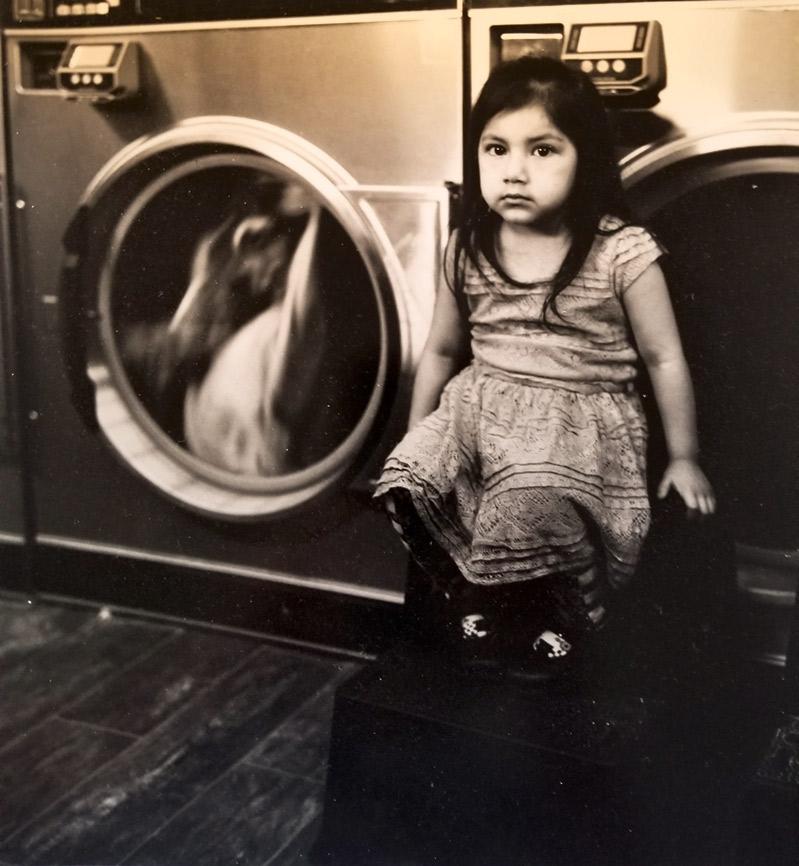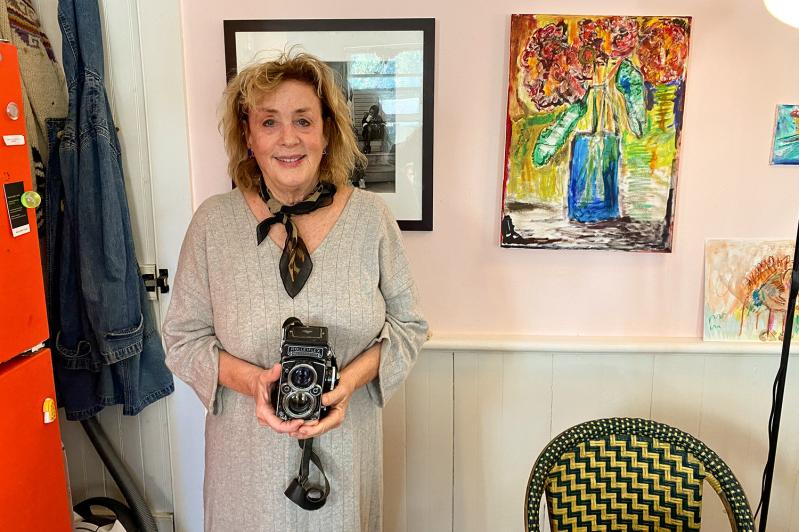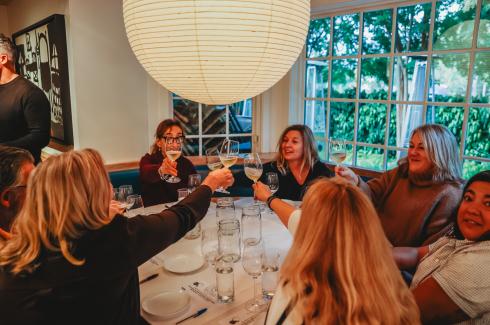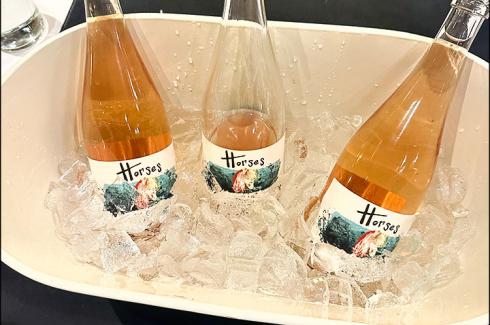Linda K. Alpern's notable career as a photographer, which took off in earnest in 1988, was intertwined, especially at first, with a seemingly unrelated passion. After growing up in Fort Lauderdale, Fla., she earned a nursing degree in that state from Santa Fe Community College in Gainesville. "I would say it was a calling," she said.
She followed that calling to San Francisco in the early 1980s, and worked at the School of Medicine of the University of California-San Francisco just as AIDS and H.I.V. were ramping up.
Through her work during the height of the AIDS crisis, "I became so brave that I could probably go into a war zone. I started IV drips, I would push narcotics on the floor, if they needed morphine, I understood that."
Ms. Alpern moved to Sag Harbor in 1988, "when San Francisco just crashed, it was horrible, everybody was dying." Because she needed a job here, she went to Southampton Hospital, but encountered ignorance about AIDS and resistance to her doing the kinds of things she did routinely in San Francisco.
She started to work privately doing different kinds of home care for 25 years, but while she has kept up her nursing license, she no longer practices. However, it brought her almost immediately into an orbit that impacted her photography, which she had only begun to explore while in San Francisco.
That she "found her palette" here was borne out years later when Robert Long, reviewing her 2005 solo show at Guild Hall for The Star, wrote, "Ms. Alpern is a photographer who not only has produced enough first-rate work to fill a gallery, but who leaves us wanting more." That exhibition, a result of her winning top honors at the Guild Hall Artist Members Exhibition in 2004, followed her 2003 residency at the American Academy in Rome.
Returning to 1988, while she worked for "a lot of wonderful non-famous people," one of her first clients was Alfonso Ossorio, the artist and owner of the Creeks in East Hampton, who was recovering from open heart surgery.
"I worked with him and walked the gardens as a nurse, but I never wore a uniform again," Ms. Alpern said. Early on, while strolling the 65-acre property, "I asked him which tree was the Christmas tree. He picked up his cane, smashed it on the table and told Ted Dragon, his partner, what an idiot I was." However she was eventually able to lead tours of the gardens and photographed it extensively with a Rolleiflex camera given her by the artist Dan Welden.
Of the Creeks, she said, "It was a very unconventional house, and the most brilliant mind I had ever met was Alfonso." She photographed him as well, notably in his bathtub, which is her favorite among many. Picking up a different photograph of him, she said, "Look how stylish he was, with his backwards cap and beautiful cane."
Ms. Alpern soon was making home visits to Dan Flavin, who was diabetic, and Chuck Close, and photographed them both. She stressed that even though she has photographed many artists over the years, among them John Chamberlain, Mabel D'Amico, and Dorothy Norman, "All those people I photographed were part of my life."

That statement explains the obvious trust her subjects have in her, whether they are artists or nurses in India or immigrants' children at the Sag Harbor Laundromat. In fact, children figure as prominently in her work as artists, and the images, whether a cluster of teenage skateboarders, a group of Black men on a bridge in Paris, or an angelic little girl in Vietnam, are inevitably compelling.
That trust is perhaps most evident in her series of Mylar portraits, which date from the 1990s. In some she photographs the distorted reflections of her subjects on Mylar panels, in others she includes the subject in the same space as the Mylar reflection. The results are fascinating, if not necessarily flattering.
Close used to say he didn't know where she got her confidence. "I had other insecurities, but I never had a problem with the camera. It was like I was comfortable, and people trusted me. If people don't want to be photographed, I really don't pursue it, because chances are I'll never get the relationship."
"Inner Mirror," an exhibition of photographs from the Mylar series organized by the Monira Foundation, is on view at Mana Contemporary, a cultural center in Jersey City, through January. In addition to Close, her many Mylar subjects include Christophe de Menil, Larry Rivers, Steve Miller, Amy Zerner, and Robert Dash.
"The distorted shapes viewed from her Rolleiflex lens and projected on surfaces covered with Mylar are her own constructed ways of seeing, where the camera angle, perspective, light, and position of the subject can suddenly transform the final image," says the Mana website.
That show materialized because of a residency at The Church in Sag Harbor, where she met another resident, Jamie Diamond, a photographer. "She threw me in her car in January, drove me to Jersey City, and introduced me to the curator."
During the pandemic, she created a collection of spiral bound books of photographs on high quality matte paper, which she brought with her to Mana. The exhibition followed soon after.
Ms. Alpern still uses the Rolleiflex, the medium format high-end twin lens reflex camera given to her more than 30 years ago. "I use a light meter, but not a tripod. I'm pretty fast. Once I put it on the tripod, I lose it. I'm not Richard Avedon." She works exclusively in film, though she admits to occasionally taking a shot with her iPhone.
Several years ago, she began to paint. A friend, Chris Kohan, the president of the D'Amico Institute of Art on Napeague, gave her a table for her materials, she acquired an easel, and began to paint in the parlor room that serves as her studio. "I think for the rest of my life I'll probably incorporate painting and photography," she said.
In a series of paintings of flowers on paper, some of them start as photographs, which she then draws and paints over, while others begin as drawings. Considering the time she spent photographing in the gardens of the Creeks, her preoccupation has deep roots.
While growing up, her family wasn't especially interested in the arts, but she attended a progressive school in Fort Lauderdale that she likened to Hayground or the Ross School. "I think I was able to grasp more creative things because of that, even though I didn't go to college for art. Even in elementary school, I kind of knew which kids were creative."
Ms. Alpern's studio and living room are filled with piles of photographs, negatives, and paintings. Self-taught, she has shown in museums and galleries and her work is in public and private collections, but one senses she has always followed an independent path, perhaps in part because of some advice from another artist known for his portraiture and his independence.
"Chuck Close said, 'Don't do it for a living. You'll lose your edge, and you'll never have that again.' "
She listened.




